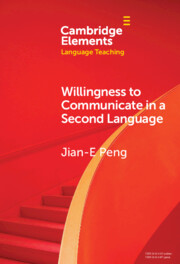Refine search
Actions for selected content:
1 results

Willingness to Communicate in a Second Language
-
- Published online:
- 25 December 2024
- Print publication:
- 06 February 2025
-
- Element
-
- You have access
- Open access
- HTML
- Export citation
